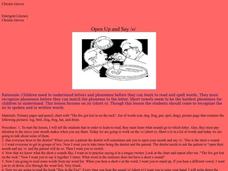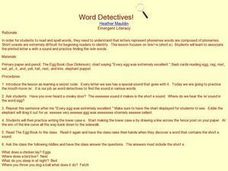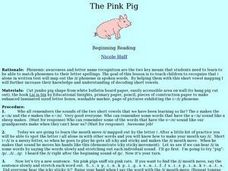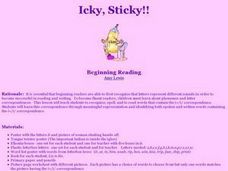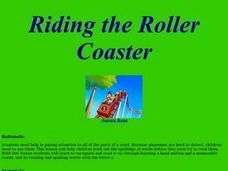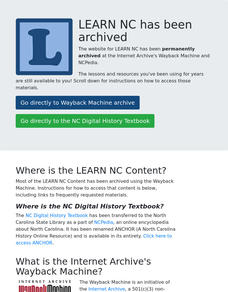Curated OER
Casper the Cat
Students examine the letter 'a'. Through instruction and modeling and a variety of practice activities, they explore the sound the letter makes and how the letter is written. They recite tongue twisters, read stories and use letterboxes...
Alabama Learning Exchange
Phonics lesson for -ick family
Kindergarteners and first graders develop phonemic awareness for words that contain -ick. Each learner gets a stack of cards with different -ick words, highlighting the target sound as they review each one.
Curated OER
Combining Syllables to Form 2- and 3-Syllable Words
Students practice combining consonant-vowel-consonant sounds to form words. They read closed and silent "e" syllables. Students construct two-syllable words. They arrange syllables to form three and four syllable words.
Curated OER
A? Speak up, I can't hear you!
Students become phonemically aware of various sounds that make up written words. This lesson focuses on the vowel correspondence a_e=/A/. They decode the long a mouth moves in words as well as practice spelling the words themselves.
Curated OER
Picture Match
Students match pictures with words that have specific phonics connotations. For this picture matching lesson plan, students have groups of words with the same phonics sayings.
Curated OER
Build it Up
First graders practice spelling words through by blending sounds with a focus on short vowels i and a. Through matching and listening activities, 1st graders replace initial and final sounds to create words they decode and read.
Curated OER
Open Up and Say /o/
Young scholars explore letters and phonemes. They discuss the phoneme /o/. Students recognize /o/ in both spoken and written words. They discuss the shape their mouths make when saying /o/. Young scholars learn a tongue twister to help...
Curated OER
Icky "I"
Students recognize the short vowel i in written and spoken language. Through matching activities, they discriminate the short vowel /i/ from other vowel sounds. Students associate the phoneme with its letter representation and identify...
Curated OER
Word Detectives!
Students recognize the short vowel e in written and spoken language. Through matching activities, students discriminate the short vowel e from the long vowel o. They associate the phoneme with its letter representation and identify the...
Curated OER
Appetizing Apples
Pupils recognize the short vowel a in written and spoken language. Through matching activities, students discriminate the short vowel a from the long vowel a. They associate the phoneme with its letter representation and identify the...
Curated OER
The Pink Pig
Students identify the short /i/ sound in spoken words and the letter symbol in this lesson plan. They say a tongue twister emphasizing words with the short /i/ sound. They then read the story "Liz is Six" and identify the words with...
Curated OER
Open Wide
Students recognize the short vowel o in written and spoken language. Through matching activities, students discriminate the short vowel o from the long vowel o. They associate the phoneme with its letter representation and identify the...
Curated OER
Icky-Sticky
Students practice recognizing the connection between phonemes and letters with an emphasis on finding the short vowel /i/ in words. They each receive a Elkonin letterbox and a picture card with icky-sticky gum on it and the letter i.
Curated OER
Doctor Check-Up
Students recognize the short vowel o in written and spoken language. Through matching activities, students discriminate the short vowel o from the long vowel o. They associate the phoneme with its letter representation and identify the...
Curated OER
Icky Fingers
Students are introduced to digraphs so they can match letters to their phonemes. They recognize the short vowel i=/i/ in both spoken and written words by practicing reading and spelling words containing /i/. Elkonin Letter Boxes are...
Curated OER
Say Ahh!!
Students identify the short /o/ sound in spoken words, and recognize the letter symbol /o/. They say a tongue twister emphasizing words with the short /o/ sound. They then listen to the story "In the Big Top" and identify the words...
Curated OER
Open Wide
Students practice letter(s) map(s) along with phoneme sequences and sounds that make the /o/ sound in both spoken and written formats. They also decode words containing /o/ sounds to work towards becoming more fluent readers beginning...
Curated OER
Riding the Roller Coaster
First graders recognize the short vowel a in written and spoken language. Through matching and listening activities, they discriminate the vowel sound /a/ from other phonemes. Students associate the phoneme with its letter representation...
Curated OER
Bless You
Students practice recognizing the phoneme /a/ in spoken and written words as well as by symbol. They interact with the book, "The Cat Nap," from Educational Insights and the Dr. Seuss book, "ABC's Book." Each student also plays a memory...
Curated OER
Icky Sticky Inchworm
Students recognize the short vowel i in written and spoken language. Through matching activities, they discriminate the short vowel /i/ from other vowel sounds. Students associate the phoneme with its letter representation and identify...
Curated OER
Number Recognition Games
Students explore number sense by participating in a math recognition activity. In this number identification lesson, students practice pronouncing names of numbers and matching the number with an amount of objects. Students practice...
Curated OER
Trucks and Community Workers
First graders identify community helpers and their roles. In this transportation lesson, 1st graders complete a series of lessons integrating technology and literacy. Students decode sounds of short u, c/s/ and g/j/ words and improve...
Curated OER
Rainbow Spelling (Kinesthetic Approach To Encoding)
Second graders demonstrate their encoding skills by spelling words using color coded paper, match correct letters with the colored paper to spell the words in standard form, and self correct any errors made in the spelling with colored...
Curated OER
Uhh I don't know!
Students engage in an emergent literacy lesson in order to work on the skill of phonem ic awareness. The use of flashcards is essential for the instruction of the lesson. Students match the card with its beginning phoneme.








